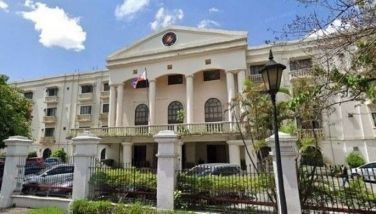GSIS reinsurance monopoly: Profile of a favored broker
November 12, 2001 | 12:00am
(Fifth of a series) |
Click here to read Part II
Click here to read Part III
Click here to read Part IV
Click here to read Part V
The Government Service Insurance System’s dealings with Orient Pearl, however, violate its own policy of reinsuring directly with the National Reinsurance Corporation of the Philippines or with local and foreign reinsurers with a net worth of at least P50 million and $20 million, respectively. Records show that Orient Pearl has a paid-up capital of only P62,500 and resources of P1 million in 2000.
Anacion said Orient Pearl has so far already referred around five big "private" accounts to GSIS. He boasted that the premiums Orient Pearl now handles are "much, much bigger than Napocor," totaling $14 million.
Justifying the business, he said: "I’m not a risk-taker so I just place from GSIS." These are "facultative" placements where Orient Pearl does not have to absorb the risk but merely passes it on to another company like Jardines, he said.
This would explain why the company only earned P8 million in commissions last year, he said. "Even on a premium of, say, P500 million, I would be happy just to get a fee of P5,000 para lang kumita (just so I could earn)," Anacion said.
Though he left Jardines in 1999 when the British firm decided to shut down its reinsurance business which he helped build and managed, Anacion said he continues to handle Napocor’s account for Jardines.
In fact, he claimed he was entirely responsible for the big-ticket account–from the solicitation, the preparation of tenders in the past three years, down to the documentation on negotiations for the renewal of the $13.5-million policy last year. Anacion said "God is so kind" to him that the Napocor deal has fallen on his lap since 1998.
This was partly because of Jardines’ maverick style in approaching the London market, he said, allowing it to beat global giants Aon Corp. and ALS Insurance Services-Willis Corroon in the last tender for Napocor.
In the March 1999 bidding, ALS-Willis Corroon was the original winner but failed to place the deal with international reinsurers in three weeks. Industry sources said ALS-Willis Corroon officials privately blamed the GSIS for changing the bidding terms in the middle of the placement period but this could not be independently confirmed.
Second-best bidder Aon, which teamed up locally with the Ayalas, also failed after the GSIS gave it only three days to make the placement abroad.
Anacion said Jardines, which then gave the third-best bid, was able to place it in just 24 hours to clinch the $5-million deal. He admitted Jardines already got ahead the commitment of London underwriters to support its $5-million quotation. The international reinsurers thus no longer supported the tenders of ALS-Willis Corroon and Aon, which only went to the market after winning in the bidding. They saw the promise of fetching bigger commissions from Jardines’ bid, he explained.
When Jardines was given the 24-hour deadline to place the deal, Anacion said he did not even see the need to go to London "because when I got the quotation, nakapirma na lahat yung underwriters na may rate na supported" (the underwriters have already signed up and indicated their pricing).
Local brokers working for foreign companies in Manila say this strategy may be effective but not usually done as no reinsurance brokers would be willing to stake their reputation if the tender goes awry. "What if you already got confirmations on your quote but you still lost in the bidding? You’ll just be embarrassed," one broker says.
Honesto General, a long-time insurance broker and an insurance columnist, says the strategy could only be resorted to if the bidder was "very sure" it will eventually bag the deal. In the case of Jardines, he said, the foreign broker may have gotten an assurance from GSIS ahead of the bidding that is why it is confident it would end up with the account.
A repeat of the 1999 scenario may have happened last September when Napocor went to the market to insure its $6.5-billion assets and failed to lure reinsurers to its public bidding.
Prior to the bidding, Jardines already warned Napocor of a possible failed bidding due to "increasing signs of hardening" in the market that could make reinsurance at the time costly for the state agency.
In a Sept. 20, 2001 letter to Napocor, JLT Risk Solutions Asia, Jardines’ Singapore unit, also said "at the request of GSIS" it tried to get reinsurers to agree on a 60-day extension on the policy but was rebuffed. Jardines instead offered to renegotiate its contract with Napocor.
Since Jardines was actively negotiating for the Napocor policy representing GSIS, foreign reinsurance brokers said this "created confusion" in the market and prevented underwriters from taking any interest in the broker tapped by Napocor for its own bidding.
Napocor blamed Jardines’ "blocking tactics" for its failed bidding for the 2001 to 2002 policy. Despite being the largest client of insurance firms in the country, Napocor found no takers and was unable to get insurance.
As a result, never has Napocor been exposed to so much risk as now, with its $6.5 billion worth of assets vulnerable to financial losses. Should one of its power plants bog down, the agency would not have the cash to fix it, nor the insurance to cover for the loss.
BrandSpace Articles
<
>
- Latest
- Trending
Trending
Latest






























